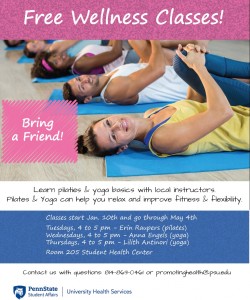Category Archives: Stress Management
Stress Less Series with Healthworks and Healthy Penn State Ambassadors
Stress Less Series with Healthworks and Healthy Penn State Ambassadors
Test Anxiety
As finals week approaches, most Penn Staters begin to flock to their favorite study spots to start preparations for a grueling week of exams and projects. Worrying about exams is common, and can even help your mind stay focused and sharp. However, when worrying becomes intense and overwhelming, it may be test anxiety.
Test anxiety can affect anyone. Experts suggest a few simple strategies that everyone can use to help reduce test anxiety and increase your chances for success during finals week.
- Learn what study styles work for you. Think about exams you have done well on in the past. How did you study for those exams? Consider using similar strategies for upcoming exams.
- Establish a routine. Make a schedule for the next few weeks to help you follow a similar routine each day. On the days of your exams, follow the same steps. This will help you feel calm and well prepared.
- Eat healthy and stay hydrated. Drink plenty of water and fuel your body with healthy food during study sessions. Your body and brain need attention when studying. Check out some easy, healthy recipes at: https://healthypennstate.psu.edu/eating/cooking-videos-healthy-eating-with-healthworks/
- Be active. Exercise to relieve stress and boost your mood. Although you may feel like you are too busy studying, it’s important to take an active break.
- Sleep is important. Sleep after studying to help encode new information into long term memory. This will help you recall the information on the day of the exam. Getting a good night’s sleep is important when you’re studying for exams.
- Take a break. Check out Penn State Libraries’ De-Stress Fest.
- Ask for help. Consider meeting with your professor or a staff person from Counseling and Psychological Services (CAPS). If you think you are experiencing test anxiety, talk to somebody about it. Book an appointment with CAPS at: 814-863-0395.
http://studentaffairs.psu.edu/counseling/self-help_anxiety.shtml
Take advantage of the free stuff in Health Promotion and Wellness
If you are looking for some free ways to be active, join us every Monday at 3:45-4:45 at the Rec Hall track for a walking group. For more information, click here. If you’re interested in free wellness classes, UHS offers Pilates and Yoga classes on Tuesday, Wednesday and Thursday in room 205 Student Health Center from 4:00 to 5:00 pm. See the flyer below for more information. Looking for a De-stress zone? Visit Health Promotion and Wellness, in 201 Student Health Center, to relaxing. While you are there, check out the biofeedback software and relaxing sound tracks.
Health Promotion and Wellness has lots of great resources that are free to every students, including free condoms, HIV testing, sleep kits and a stress management workbook. 201 Student Health Center is open Monday-Friday 8 am – 5 pm. We look forward to seeing you soon!
Stress, Food and Exercise During the Holidays
Do the holidays create stress for you? Do you feel pressure to overeat at meals and parties? Here are ways you can incorporate a variety of nutritious foods and activity during this busy time of year:
- Keep healthy snacks with you, for example, fruit and cheese, peanut butter and crackers, yogurt
- Eat consistently to avoid getting over-hungry
- Drink sparkling water instead of eggnog, beer and mixed drinks
- Bring a healthy dish to share at parties
- Eat when you are hungry, stop when you are full
- Make time to exercise. It’s a great way to relieve stress
- Go for a walk before or after a holiday party or get together
- Fill up on nutrient dense foods including fruit, vegetables, whole grain breads and crackers, lean meats and cheeses
Health Benefits of Swimming
Swimming is a great way to improve your mental and physical health. It increases muscle strength and flexibility and allows you to work out vigorously with little chance of injury to your joints. Swimming also trains the body to use oxygen more efficiently. Focusing on breathing and body movements adds a meditative aspect to swimming which can reduce stress.[i]
Think swimming is a summer thing? Think again. The Penn State Natatorium is available year round to Penn State students. Indoor pool admission is included with a PSU fitness pass; single day admission for students who do not have a pass is $3. Be sure to check the calendar for public swim times.
It’s never too late to start swimming. Penn State Aquatics offer adult courses for beginners as well as advanced swimmers. Aquacise is a great option for those who aren’t into swimming but still want to benefit from water-based exercise.[ii]
[i] http://www.health.harvard.edu/family-health-guide/take-the-plunge-for-your-heart
[ii] http://studentaffairs.psu.edu/campusrec/rec/nat/
Belly Breathing for Relaxation
Deep breathing or diaphragmatic breathing is often referred to as “belly breathing.” Natural breathing focuses on filling the chest with air. Breathing for relaxation requires inhaling in a way that expands the lungs downward and allows more air to enter the body. Belly breathing provides much more oxygen to the body and helps to lower stress response. Most people feel a decrease in stress and tension within 2-3 deep belly breaths. Try belly breathing throughout the day, perhaps before you eat, before class begins, and certainly any time you are feeling stressed.
How to Belly Breathe:
- Place one hand on your abdomen above your belly button and one hand on your upper chest.
- Relax your abdomen
- Breathe in through your nose and fill your lungs.
- Allow your lungs to expands downward and move the bottom hand.
- Avoid shallow chest breathing or raising your shoulders.
- Exhale slowly through pursed lips.
Debra Burdick, L. B. (2013). Mindfulness Skills Workbook for Clinicians & Clients. Eau Claire, WI: PESI Publishing and Media.
Change your password; Change your life
Remembering computer and other passwords can be an annoying part of modern life. What if your password was a mantra to help stay focused on something you want to achieve? It could be “BUILDNEWFRI3NDHIPS,” “BREATHE2RELAX,” or “MAKEDEANSL1ST.” It would give you an opportunity to repeatedly remind you to keep working toward the things that make you happy. And it might make remembering your password a little easier.
Smith, M. A. (2016). Calm; Calm the mind, change the world. New York: Harper Design.
Connect your Body, Mind & Soul
A new yoga studio is opening in State College. On August 22nd, Yoga Lab will open its doors. It is located on 124 McAllister Alley. Visit the website for the class schedule at www.statecollegeyogalab.com
State College has a wide range of yoga options. Below is a list of a few studios in town. All of them feature a different style of yoga, so explore and find the style that works best for you. You may want to look into the Penn State Yoga Club, to connect with those who share a similar interest.
Yoga options in State College:

